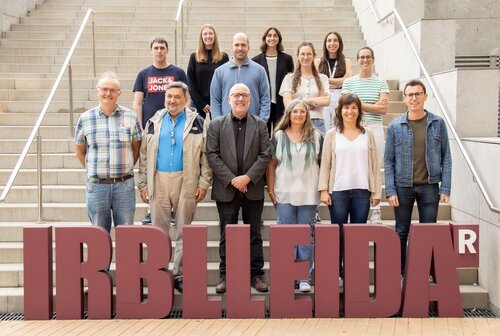New advance to understand ALS disease
By using ASO molecules, which are very versatile, to slow the progression of the disease in experimental models
Currently, people who live with amyotrophic lateral sclerosis (ALS) do not have an efficient treatment, since we do not know the mechanisms of the disease. People diagnosed with this neurodegenerative disease, which manifests itself in adulthood, have an average survival of three years. Patients lose mobility, as well as speech in some cases, with a fatal end to the progressive death of neurons responsible for movement control.
A research led jointly from Lleida and Oxford has published a new research in the journal Acta Neuropathologica, which offers a new finding to understand the disease. This demonstrates the key role of the loss of ATG4B enzyme function for disease progression. It also demonstrates a possible new way of treatment in cell models through the use of ASO molecules (antisense oligonucleotides), very versatile to, in the future, slow or stop the progression of the disease.
"This discovery allows us to advance in understanding the disease. It is a first step also to determine whether our drug candidate molecule is effective in slowing down the disease in people with ALS. This path involves between 10-15 years of testing in various animal models and regulatory clinical trials phases before its approval to be able to prescribe it to patients," explained the first author of the research, researcher at the University of Lleida (UdL) and the Institute for Biomedical Research of Lleida (IRBLleida), Pascual Torres.
The research has been carried out with 42 samples from people affected by the disease that were obtained from the Institute of Neuropathology and the Brain Bank of the University of Barcelona, and with the analysis of 81 mice affected by the disease. The metabolic pathophysiology research group led by Reinald Pamplona, professor at the UdL and principal investigator at IRBLleida, has promoted this research in Lleida.
This research has been possible thanks to the funding of the Carlos III Health Institute (PI 20-00155), the Ministry of Universities of the Government of Spain, through the Margarita Salas Program, the Department of Research and Universities of the Generalitat de Catalunya, and the Luzon Foundation.
Reference article: Torres, P., Rico-Rios, S., Ceron-Codorniu, M. et al. TDP-43 regulates LC3ylation in neural tissue through ATG4B cryptic splicing inhibition. Acta Neuropathol 148, 45 (2024). https://doi.org/10.1007/s00401-024-02780-4

The metabolic pathophysiology research group led by Reinald Pamplona






